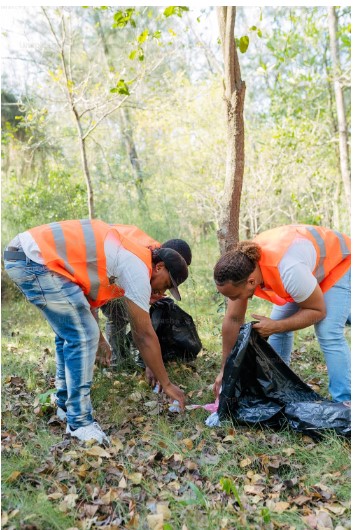Eco-Volunteering Personal Development
Are you passionate about the environment and looking for a meaningful way to give back? Consider eco-volunteering, an opportunity that not only allows you to contribute to environmental conservation but also offers personal and professional development.
What is Eco-Volunteering?
Eco-volunteering combines volunteering and travel, making it a unique and rewarding experience. By participating in conservation projects such as tree planting, wildlife monitoring, or beach cleanups, you actively contribute to preserving our planet’s natural resources.
Eco-volunteering is not just about doing manual labor. It’s about actively engaging with the environment and learning about sustainable practices. Whether you’re working in a national park, a marine reserve, or a community garden, you’ll have the chance to make a real difference while gaining valuable knowledge and experiences.
The Importance of Environmental Stewardship
Environmental stewardship is crucial for the well-being of our planet. With issues such as climate change, deforestation, and species extinction becoming increasingly urgent, it’s essential for individuals to take responsibility for protecting the environment.
Eco-volunteering allows you to be directly involved in environmental stewardship. By participating in conservation projects, you contribute to the preservation of ecosystems, the protection of biodiversity, and the promotion of sustainable practices. Your efforts can help restore balance to damaged habitats and mitigate the impact of human activities on the natural world.
Benefits of Eco-Volunteering
Eco-volunteering offers a myriad of benefits, both for the environment and for yourself. First and foremost, it provides a unique opportunity to make a positive impact on the planet. By working alongside experts in the field, you’ll gain knowledge and skills that can be applied to future conservation efforts.
Moreover, eco-volunteering allows you to connect with like-minded individuals from around the world. You’ll form lasting friendships and create a network of passionate environmentalists who share your values. Collaborating with others who are equally committed to environmental causes can be incredibly inspiring and can fuel your motivation to continue making a difference.
Additionally, eco-volunteering can be an impactful addition to your resume and can set you apart in a competitive job market, especially in fields related to environmental sciences, conservation, or sustainability. Employers value individuals who actively engage in environmental issues and demonstrate a commitment to making a positive impact.
Popular Eco-Volunteering Opportunities
There are numerous eco-volunteering opportunities available worldwide. Whether you’re interested in working in remote rainforests, pristine coral reefs, or urban gardens, there’s a project waiting for you. Here are some popular eco-volunteering opportunities to consider:
- Wildlife Conservation: Participate in projects that focus on the protection of endangered species, such as sea turtles, elephants, or orangutans. Assist with data collection, habitat restoration, and research activities.
- Marine Conservation: Contribute to the preservation of marine ecosystems by participating in projects that involve coral reef monitoring, beach cleanups, or marine mammal research.
- Community-Based Conservation: Engage with local communities and help them develop sustainable practices that benefit both the environment and their livelihoods. This can include initiatives such as organic farming, eco-tourism, or waste management.
- Forest Restoration: Join reforestation projects and work towards restoring degraded forests, combating deforestation, and promoting sustainable land-use practices.
How to Find Eco-Volunteering Projects
Finding the right eco-volunteering project can be overwhelming, but with proper research and planning, you can discover opportunities that align with your interests and goals. Here are some steps to help you find the perfect eco-volunteering project:
- Research Organizations: Look for reputable organizations that offer eco-volunteering programs. Read reviews and testimonials to ensure they prioritize environmental conservation and provide meaningful experiences.
- Consider Location: Decide if you want to volunteer locally or internationally. Consider the environmental issues you’re most passionate about and choose a location that allows you to make a significant impact.
- Evaluate Project Objectives: Review the objectives and goals of each project. Ensure they align with your personal values and interests. Look for projects that focus on long-term sustainability and community involvement.
- Assess Costs and Logistics: Consider your budget, the duration of the project, and any necessary travel arrangements. Some organizations provide accommodation and meals, while others require you to cover these expenses.
- Contact the Organization: Reach out to the organization to clarify any doubts and ask questions about the project. Ensure you have a clear understanding of the responsibilities, expectations, and support provided.
Planning Your Eco-Volunteering Experience
Before embarking on your eco-volunteering adventure, proper planning is essential to ensure a smooth and fulfilling experience. Here are some steps to help you prepare:
- Research Destination: Learn about the culture, environment, and regulations of your chosen destination. Familiarize yourself with local customs and traditions to ensure you show respect and sensitivity.
- Pack Thoughtfully: Pack essentials such as sturdy shoes, appropriate clothing, and sunscreen. Consider bringing reusable items like water bottles and bags to minimize waste and promote sustainability.
- Learn Basic Skills: Familiarize yourself with basic skills relevant to your chosen project. This could include plant identification, data collection methods, or wildlife observation techniques.
- Stay Open-Minded: Embrace new experiences and be open to learning from different cultures and perspectives. Respect the knowledge and expertise of the local communities you’ll be working with.
- Reflect and Share: Take time to reflect on your experiences and share them with others. By sharing your journey, you can inspire and educate others about the importance of environmental stewardship.
Personal Development through Eco-Volunteering
Eco-volunteering not only contributes to environmental stewardship but also offers personal development opportunities. By immersing yourself in conservation projects, you’ll develop a range of skills and qualities that can benefit various aspects of your life.
Working alongside experts in the field, you’ll learn about sustainable practices, ecosystem protection, and biodiversity conservation. This knowledge can be applied to everyday life, enabling you to make more informed choices and advocate for environmental causes.
Moreover, eco-volunteering fosters personal growth by challenging you to step out of your comfort zone. You’ll develop teamwork, communication, and leadership abilities as you collaborate with like-minded individuals from around the world. These skills are transferable and can enhance your professional and personal relationships.
Eco-Volunteering and Professional Growth
Eco-volunteering can have a significant impact on your professional growth. It provides you with unique experiences and skills that can set you apart in a competitive job market, especially in fields related to environmental sciences, conservation, or sustainability.
Employers value individuals who actively engage in environmental issues and demonstrate a commitment to making a positive impact. By showcasing your eco-volunteering experiences on your resume, you demonstrate your dedication to environmental stewardship and your willingness to take initiative.
Furthermore, eco-volunteering allows you to network with professionals in the field, potentially leading to valuable connections and job opportunities. You’ll have the chance to learn from experts, gain industry insights, and receive mentorship that can support your career development.
Eco-Volunteering and Community Engagement
Eco-volunteering goes beyond personal and professional development. It also allows you to engage with local communities and contribute to their well-being. By working alongside community members, you can support sustainable development initiatives that provide economic opportunities while safeguarding the environment.
Community engagement is a crucial aspect of eco-volunteering as it ensures that conservation efforts are inclusive and address the needs and aspirations of the local population. By involving communities in decision-making processes and capacity-building activities, you foster a sense of ownership and empower them to become environmental stewards themselves.
Conclusion
Embarking on an eco-volunteering adventure offers a unique opportunity to contribute to environmental conservation while enriching your personal development. By actively engaging with the environment and working alongside experts, you’ll gain valuable knowledge, skills, and experiences that can positively impact your life and the planet.
Eco-volunteering not only allows you to make a difference but also sets you apart in a competitive job market. Employers value individuals who demonstrate a commitment to environmental stewardship and actively engage in conservation efforts.
So, whether you’re passionate about wildlife conservation, marine protection, or community-based initiatives, eco-volunteering is a rewarding and transformative experience that combines your love for the environment with personal growth. Embrace the opportunity to become an environmental steward and make a lasting impact on our planet.






